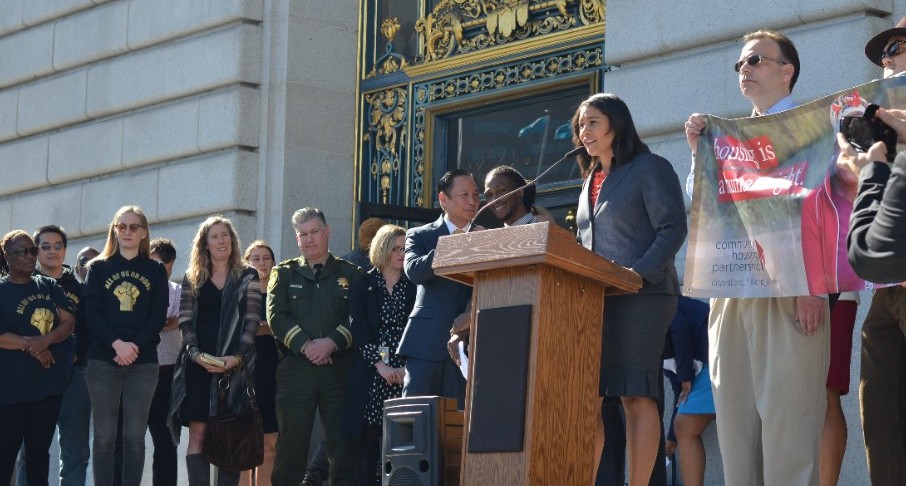The San Francisco Financial Justice Project releases new report: Criminal Justice Administrative Fees: High Pain for People, Low Gain for Government

San Francisco Board of Supervisors President London Breed introduces legislation alongside community advocates and government partners
Nicole, a San Francisco resident, works seven days a week. She starts her days at 7 am and works until 11 am for an online shopping service. She then rushes home to change clothes before her second job as a home health aide to an elderly man in her neighborhood. She estimates she earns about $1,200 a month to support herself and her two daughters.
Like other people who exit the criminal justice system, when Nicole left jail in 2008, her debt to society was not yet repaid. For ten years, Nicole never took home her full paycheck. A few hundred dollars were garnished from each paycheck to pay off thousands of dollars in debt from her time in the criminal justice system. While she dreamed of going back to school to become a Certified Nursing Assistant, she knew she wouldn’t be able to get her license until this debt was paid.
When individuals exit jail or the criminal justice system, they are often assessed thousands of dollars in administrative fees that aim to recoup costs for the courts and government. For example, in San Francisco people can be charged a monthly $50 probation fee; up to $35 a day to rent an electronic ankle surveillance monitor, and other fees to pay for reports, collections costs, or tests. The fees can add up to thousands of dollars.
On Tuesday, May 22, The San Francisco Board of Supervisors will consider an ordinance sponsored by Board President London Breed to make it easier for people like Nicole to get back on their feet and meet their obligations. The legislation will eliminate all locally controlled fees assessed from people exiting jail or the criminal justice system. The legislation also calls for eliminating all outstanding debt from these criminal justice fees.
The ten San Francisco criminal justice administrative fees targeted for elimination by this legislation are assessed on individuals who have already paid other consequences for their crimes. They have often served time in jail, paid other fines or are paying victim restitution. The goals of these local criminal justice fees are to recoup costs, not create an additional layer of punishment. Over the last six years, over 20,000 individuals have accumulated more than $15 million in unpaid debt from locally authorized fees. This legislation calls for the elimination of this outstanding debt.
Today, the Financial Justice Project is releasing a report that outlines our research and key findings: Criminal Justice Administrative Fees: High Pain for People, Low Gain For Government. The report outlines three key problems with charging these administrative fees:
1. These criminal justice administrative fees are primarily charged to low-income people who cannot afford to pay them. The vast majority of people exiting jail or prison are unemployed, have unstable housing, have no steady source of income, and find work difficult or nearly impossible to obtain after release.
2. Criminal justice administrative fees create barriers for people to re-enter the community and increase the likelihood of recidivism. People with unpaid fees and fines are often unable to clear their records, which can make it hard to get a job or business license. Research shows that the fees can push individuals into underground economies and can result in individuals turning to criminal activity to pay their debts.
3. Criminal justice administrative fees are counterproductive, ineffective and anemic sources of revenue. These fees are often “high pain” for individuals and “low gain” for government. Very little revenue comes in from these fees, simply because people cannot pay them.
The Financial Justice Project collaborated with the Public Defender’s Office and Mayors Budget Office to research the fiscal and human impacts of these fees. The new report is co-authored by Christa Brown and Anne Stuhldreher in the Financial Justice Project and Donna Mandel in the San Francisco Public Defender’s Office.
Many people came together across San Francisco to advance these reforms. The San Francisco Public Defender’s Office and The Mayor’s Budget Office conducted first-of-its-kind research. San Francisco law enforcement leaders, including Sheriff Vicki Hennessy, Adult Probation Chief Karen Fletcher and the District Attorney’s office collaborated from the beginning. Many community groups, including Debt Free SF, Community Housing Partnership, All of Us or None, and Legal Services for Prisoners with Children, opened our eyes to the human toll of these fees.
We are grateful for their partnership and for the relief that these reforms will bring to thousands of people across our city.
Yours in Financial Justice,
Anne and Christa
